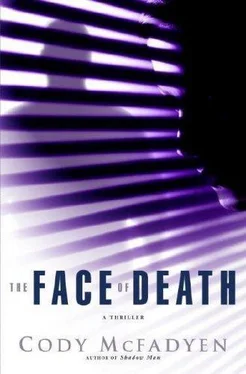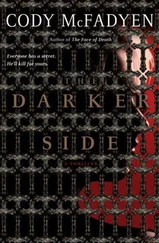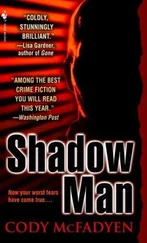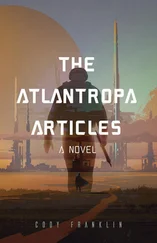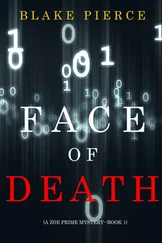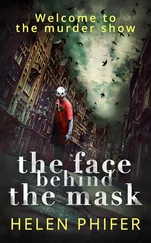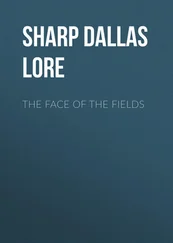The second reason for Callie's "wow" can be found in the decor. The memory of standing in Alexa's room earlier today comes to me by comparison. Sarah's room is about as far from froufrou girly-girl as you can get.
The carpet is black. The drapes on the windows are black and they're pulled shut. The bed, a queen-sized four-poster, isn't black--
but the pillowcases, sheets, and comforter on it are. It all contrasts with the white of the walls.
The room itself is a good-sized room for a child. It's about half as big as the standard-sized "kids' room" in most homes, perhaps ten by fifteen. Even with the large bed, a dresser, a small computer desk, a bookshelf, and an end table with drawers next to the bed, space remains in the center of the room to move around in. The extra space doesn't help. The room feels stark and isolated.
"I'm no expert," Barry says, "but it looks to me like this kid has problems. And I'm not just talking about a bunch of dead people in her house."
I examine the wooden end table next to the bed. It's about the height and width of a barstool. A black alarm clock sits on top of it. Its three small drawers are what interest me the most.
"Can we get someone in here to fingerprint this?" I ask Barry.
"Now, I mean?"
He shrugs. "I guess. Why?"
I relate the end of my conversation with Sarah. When I finish, Barry looks uncomfortable.
"You shouldn't have made that promise, Smoky," he says. "I can't let you take the diary. Period. You know that."
I look at him, startled. He's right, I do know it. It goes against the chain of evidence, and at least a dozen other forensic rules, the violation of which would probably send John Simmons into some kind of apoplectic seizure.
"Let's get Johnny up here," Callie says. "I have an idea on how to handle this."
Simmons looks around Sarah Kingsley's bedroom. "So, Calpurnia. Explain to me what it is you're trying to accomplish here."
"Obviously, Johnny, Smoky can't take the diary. My idea was to make a copy via photographs of each page."
"You want my photographer to spend time--now--taking a picture of every page in the girl's diary?"
"Yes."
"Why should I give this a particular priority?"
"Because you can, honey-love, and because it's necessary."
"Fine, then," he says, turning away and heading toward the door.
"I'll send Dan up."
I stare after him, bemused at his instantaneous and complete capitulation.
"How was that so easy?" Barry asks.
"The magic word was 'necessary,' " Callie says. "Johnny won't tolerate wasted motion on his crime scene. But if something is needed from his team to clear a case, he'll work them for days." She gives us a wry smile. "I speak from experience."
The diary is black, of course. Smooth black leather and small. It's not masculine or feminine. It's functional.
Blushing Dan the Photographer Man is here, camera ready.
"What we want is an image of each page, in sequence, large enough to be printed out on letter-sized paper and read."
Dan nods. "You want to photocopy the diary with the camera."
"Exactly right," Callie says.
Dan blushes, again. He coughs. This proximity to Callie seems to be overwhelming him. "No--uh--problem," he manages to stammer out. "I have a spare one gigabyte memory card I can use and let you take with you."
"All we need then, is someone to prop it open." She holds up her hands, showing the surgical gloves she's already slipped on. "That would be me."
Dan calms down once he's back and safe behind his camera lens. Barry and I watch as he shoots. The room is quiet, punctuated by the sound of the camera firing and by Dan murmuring for Callie to turn the pages when needed.
I glimpse Sarah's handwriting and at last see a hint of femininity. It's precise without being prissy. A smooth, exacting cursive, written in-- surprise --black ink.
There's a lot of it. Page after page after page. I find myself wondering what a girl who surrounds herself with the color black writes about. I find myself wondering if I want to know.
This is a lifelong battle for me: the struggle to "unknow" things. I am aware of the beauty of life, when it exists. But I'm also never un- aware of how terrible life can become, or how monstrous. Happiness, in my estimate, would be an easier state to achieve if I didn't have to reconcile these opposing forces, if I never had to ask the question:
"How can I be happy when I know, right now, at this very moment, that someone else is experiencing something terrible?"
I remember flying into Los Angeles at night with Matt and Alexa. We were coming home from a vacation. Alexa had the window seat and as we'd come down through the clouds, she'd gasped.
"Look, Mommy!"
I'd leaned over and looked through the window. I'd seen Los Angeles below, outlined in a sea of lights that stretched from horizon to horizon.
"Isn't it pretty?" Alexa had exclaimed.
I'd smiled. "It sure is, honey."
It had been pretty. But it was also terrifying. I knew right then, at that very moment, that sharks were swimming down there in that sea of lights. I knew that as Alexa smiled and goggled, women were getting raped down there, children were being molested, someone was screaming as they died too soon.
My dad once told me, "Given a choice, the average man would rather smile than hear the truth."
I had found that to be true, in victims, and in myself. It was all just wishful thinking, that hope of "unknowing." I would read the diary and I'd let that black cursive writing take me wherever it wanted to take me, and then I'd know whatever it wanted me to know.
The sound of the camera fills the room, startling me each time it goes off, like gunfire.
It's not quite nine o'clock when I head downstairs. John Simmons sees Barry and me and motions us over. He's holding a digital camera in his hand.
"I thought you'd be pleased to know," he says, "that we were able to lift a set of latent footprints from the tile. Very clean."
"That's great," I reply.
"Too bad there's no database to run it against," Barry remarks.
"Even so, the prints are noteworthy."
Barry frowns. "How's that?"
Simmons hands over the camera. "See for yourself."
It's a digital 35mm SLR camera, with an LCD screen on the back so that you can preview the photos taken. The resolution on these cameras is significant enough these days that they are the primary tool used to record raised prints. The photo on the screen is small, but we can see what John is referring to.
"Are those scars?" I ask.
"I believe so."
The sole of the foot is covered with them. They are all long and thin and horizontal, going from one side of the foot to the next, none of them lengthwise.
Barry hands the camera back to Simmons. "You seen anything like that before?"
"I have, in fact. I've done volunteer work for Amnesty International on three occasions, assisting in postmortem examinations of possible torture victims as well as evidence collection from suspected torture sites. These scars resemble the kind created when the soles of the feet are caned or switched."
I wince. "I take it that's painful?"
"Excruciating. Done inexpertly--or expertly depending on your goal, I suppose--it can be crippling, but it is generally done to punish, not to maim."
"These on both feet?" Barry asks.
"Both."
We're silent, considering this turn of events. The possibility that our perpetrator had been tortured sometime in his life was germane to his profile, if nothing else.
"It fits with the picture of him as a disorganized offender," I remark.
Even if other things don't.
"Caning of the feet is rare here," Simmons says. "Its use is predominant in South America and parts of the Middle East, as well as Singapore, Malaysia, and the Philippines."
Читать дальше
